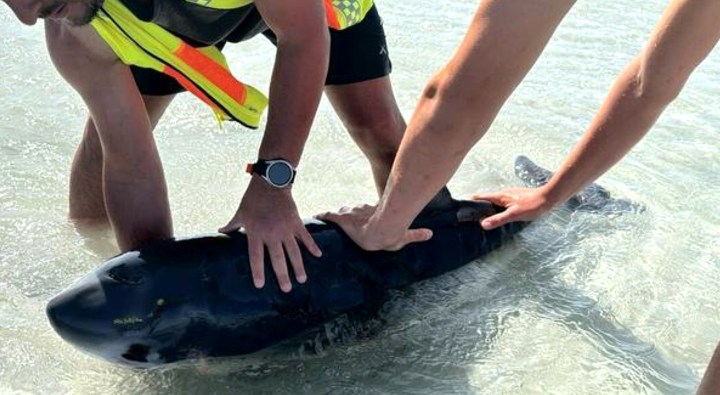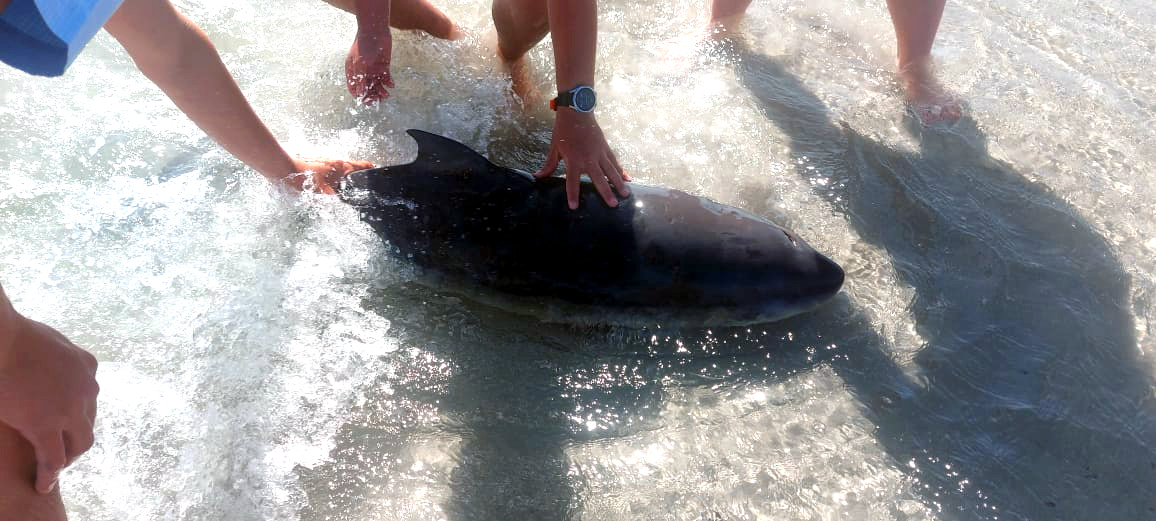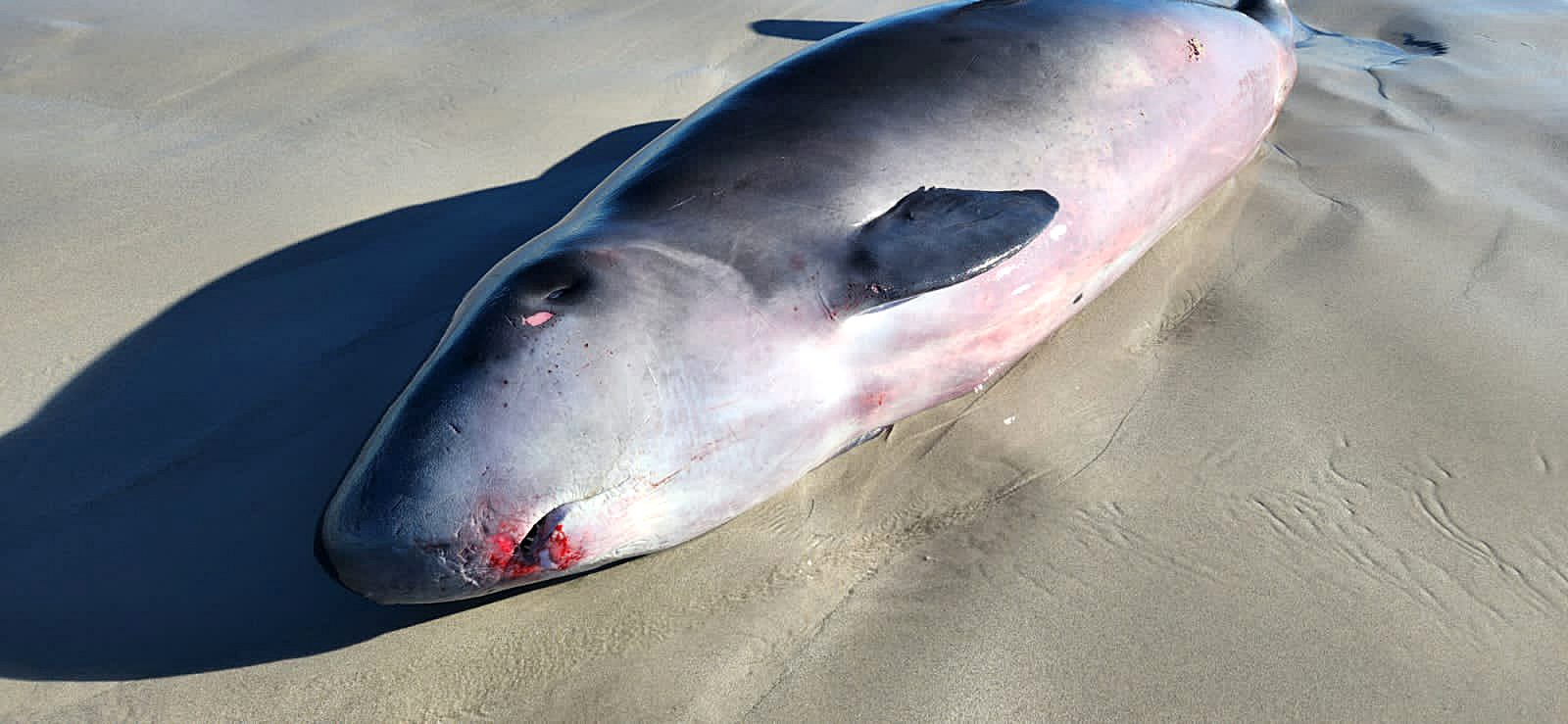MARINE MATTERS
Three stranded whales die off Cape Town coast

When pygmy or dwarf sperm whales become beached, the chances of successfully refloating them are very low as they are deep-water animals that become disorientated in shallow water close to the shore.
Three whales have died this year after beaching along the coastal regions of Blouberg and Melkbos in Cape Town.
Peter Mbelengwa, the spokesperson for the Department of Forestry, Fisheries and the Environment (DFFE), said the first incident occurred off Blouberg and was reported to the National Sea Rescue Institute (NSRI) on the evening of 16 January.
A whale, identified as a kogiid (a pygmy or dwarf sperm whale), was stuck between rocks. The DFFE’s marine mammal research officials responded, but by then the tide had risen and the whale had managed to swim free of the rocks.

On Wednesday, 17 January, an adult and juvenile dwarf sperm whale beached at Melkbosstrand. The adult was returned to the water but the juvenile later beached at Melkbosstrand. A decision was made by DEFF, in cooperation with the SPCA and City of Cape Town officials to euthanise the whale to prevent suffering. (Photo: National Sea Rescue Institute)
It was spotted the following morning and reported to the NSRI. The DFFE and City of Cape Town officials responded but found the whale had died.

On Thursday, 18 January, an adult dwarf sperm whale that beached at Melkbosstrand on Wednesday, beached again and this time was found dead by the City of Cape Town.
On the same day, a cow and calf pair of dwarf sperm whales were stranded off Melkbos. The NSRI, in consultation with the DFFE, the city and the SPCA, tried to refloat the whales.
The first attempt was unsuccessful. A second refloating attempt was conducted and was deemed successful after the whales swam off. However, the calf became stranded again and a call was made to euthanise it.
The DFFE authorised the procedure. Jon Friedman, a wildlife supervisor at the Cape of Good Hope SPCA, said the calf was vastly weakened after each successive stranding and was near death by the time it was euthanised.
“The fact that the calf eventually would not swim off with its mother, but kept returning to the beach on its own gave great cause for concern. It is our estimation that a calf of that age would not have a reasonable chance of survival in the ocean on its own, especially as it was already weak and injured from its beaching attempts.
“It appeared as if the flukes [tail fins] of the calf were also deformed, possibly at birth, meaning this young animal would be already handicapped in the ocean and was a possible reason for the beaching; it was just not strong enough to tackle the strong ocean on its own,” he said.
The mother was thought to have been refloated successfully, but the city patrolled the Melkbos coastline in case it beached again, and it was found dead offshore on the morning of 18 January.
Eddie Andrews, the City of Cape Town deputy mayor and mayoral committee member for spatial planning and environment, said when pygmy or dwarf sperm whales become beached, the chances of successfully refloating them are very low as they are deep-water animals and become disoriented in shallow water close to the shore.
Causes of cetacean strandings
The SPCA’s Friedman said dwarf sperm whales were sensitive to underwater disturbances, which could cause them to beach.
“As we understand it, most beachings in Cape Town, historically, have occurred around some or other massive under- or over-water event, be it human-induced (eg, seismic testing, chemical pollution or sonar deployment), or natural (marine heatwaves, underwater earthquakes, catastrophic weather events).
“In postmortem, we have seen ruptured swim bladders, brain aneurysms, aborted foetuses, blindness, deafness, and so on, from human-induced events, but for which there isn’t one singular main cause that we can pinpoint every time,” Friedman said.
Mbelengwa from the DFFE said the causes of strandings of cetaceans (whales and dolphins) included navigational errors due to unfamiliar topography or magnetic dead zones. Sometimes, strong currents or inclement weather forced the animals out of their familiar habitat and they struggled to reorient themselves.
“Some carcasses of seemingly healthy individuals were found with evidence of recent feeding, indicating that the animal was strong enough to hunt, but perhaps got confused. Injuries from ship strikes are also common around Saldanha Bay and Cape Town, both of which have maritime ports.
“This issue is receiving attention from appropriate authorities. Old age renders individual animals weak and ineffective in hunting and thus they naturally deteriorate in health,” he said.
The DFFE technicians and scientists who undertook the necropsies of the whales said, “All three animals appeared to be in good shape from the basic metrics (blubber size, parasite loads, injuries, etc). The first animal (male) to strand, however, had worn-out teeth; the male was thus of mature age and most likely old. It is fair to assume that this male may have had old-age-related complications.”
Deep water marine life around Cape Town
Dr Els Vermeulen, research manager of the Mammal Research Institute Whale Unit at the University of Pretoria, said it was not unusual for whales to beach in Cape Town at this time of year.
“Throughout the year we’ll get strandings of whales and dolphins around the South African coast. South Africa’s marine environment is very rich in many mammals, but unfortunately, we don’t know a lot about the animals that occur offshore like these species.
“We have a lot of information on coastal species like for example, southern rights, humpback whales and coastal dolphins, but we have a whole range of species that are present offshore, like these two dwarf sperm whales and large baleen whales that migrate past the South African coast.”
South Africa is rich in offshore marine mammal diversity, and according to Vermeulen, it is one of the richest in the world because of the confluence of the Atlantic and Indian oceans in the region that create a diverse system for a high diversity in marine species, also in marine mammals.
Read more in Daily Maverick: Orca hunt was like ‘a military exercise’ — scientist describes unexpected encounter on Cape West Coast
The cause of death in strandings of these offshore marine mammals is usually very difficult to determine if there’s not a very clear external factor.
“If we see big deep cuts, you know it’s a ship strike, or you see a rope and you know, it’s an entanglement,” she said.
Vermeulen said a study would be finalised this year involving a risk assessment on the impact of human activities, such as boat traffic or pollution, on 19 cetacean species, including whales.
The recent strandings are poignant reminders of the poor understanding we have of offshore marine life and underscore the importance of continued research, awareness, and collaborative efforts to safeguard the wellbeing of these creatures in South Africa’s coastal waters. DM






















 Become an Insider
Become an Insider
Comments - Please login in order to comment.